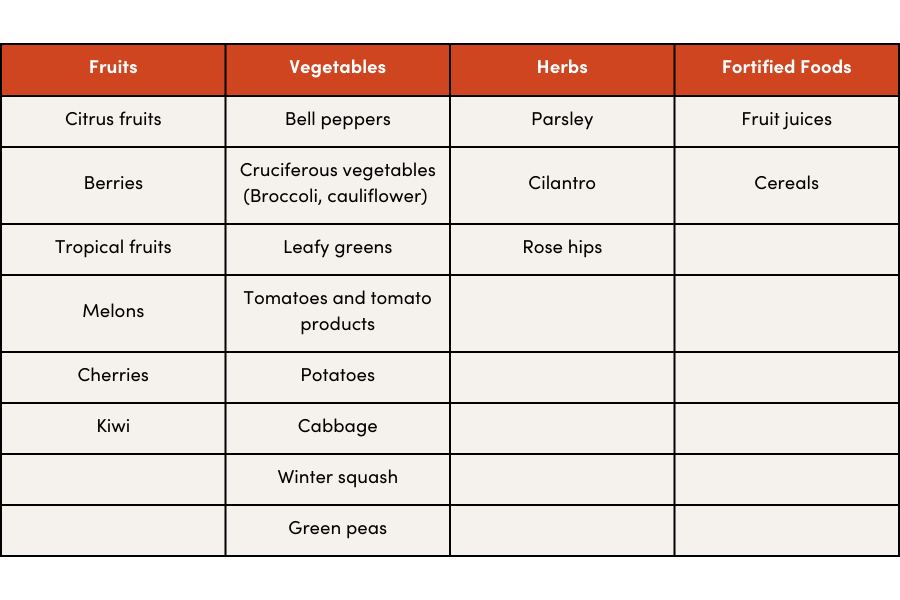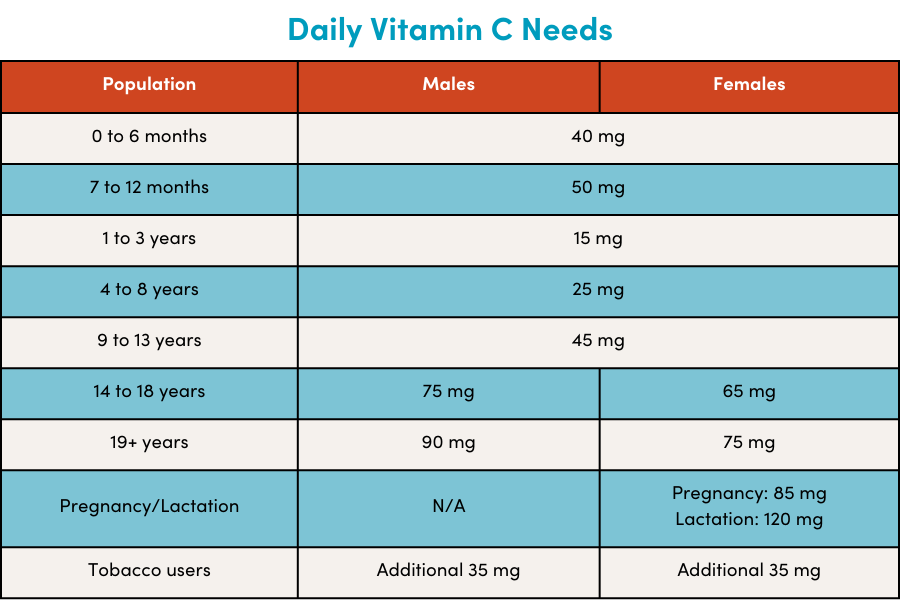Health/Wellness, Patient Blog | Dec 11 2023
Can Vitamin C prevent illness?

As we head into a change of season, it’s time to wonder what can be done (if anything) to help protect ourselves and our families from illness. This is where we often turn to adding nutrient supplementation to our daily routines in hopes that a little boost of vitamins will help ward off any unwanted illnesses that might be lurking around the corner. Vitamin C is often touted as a nutrient that can help prevent colds and the flu. But is that true?
Vitamin C is a common nutrient that most people have at least some awareness of its immune-boosting properties and some of the most common food sources that contain it. Vitamin C, also known as ascorbic acid, is a water-soluble vitamin. It is an essential nutrient, meaning that the body cannot produce it on its own, so it must be obtained through dietary sources or consumed as a supplement.
Sources of Vitamin C
Vitamin C is abundantly found in various fruits, vegetables, herbs, and fortified foods. Common sources can be found in the table below.

Effects of Vitamin C on the immune system
The effects of vitamin C can be summarized in 5 key ways.
- Supports the production of white blood cells, the body’s defense against infections.
- It is an antioxidant, which means it has a neutralizing effect on free radicals that can cause damage to our cells.
- Has anti-inflammatory properties, which help to maintain a balanced immune system as chronic inflammation can decrease immune function.
- Plays a key role in the production of collagen, which contributes to the integrity of the skin and mucous membranes. In turn, the healthier the skin is, the less likely pathogens can enter the skin’s barrier and cause infection.
- Responsible for creating antibodies, proteins that recognize when bacteria or viruses are present, which enhances the body’s immune response.
It’s important to note that vitamin C plays more of a supporting role in bolstering the immune system and skin barrier. While it does not prevent or cure illness on its own, vitamin C is essential to a healthy and functioning immune system.
Role of Vitamin C beyond immunity
In addition to its role in immunity, vitamin C also contributes to other necessary body functions including enhancing iron absorption, production of neurotransmitters in the brain that contribute to the prevention of depression and anxiety, histamine regulation, joint health, and improved cardiovascular health.
Recommended intake of Vitamin C for immune support
The Recommended Daily Allowance (RDA) for vitamin C varies depending on age, sex, and overall health status.

Other ways to support optimal health
In addition to adequate vitamin C intake through food and supplementation, there are additional diet and lifestyle choices that contribute to optimal health. Among the most beneficial ways to support overall health are:
- Regular exercise
- Adequate hydration
- Quality sleep
- Stress management
- Avoidance of alcohol and tobacco
- Mental health and wellbeing
Summary
Vitamin C can play a role in illness prevention and support of overall health. From its immune-boosting properties to its role in enhancing iron absorption and the creation of antibodies, vitamin C helps the body defend against illnesses. This vital nutrient helps ensure the body is in tip-top shape to optimize immune function. So, make sure you are consuming enough vitamin C through your diet, and supplements as needed to make up the rest. When in doubt, contact a registered dietitian to assist you in diet analysis and proper recommendations for supplementation.
References:
Moore M. How Vitamin C Supports a Healthy Immune System. Academy of Nutrition and Dietetics website. Available at https://www.eatright.org/health/essential-nutrients/vitamins/how-vitamin-c-supports-a-healthy-immune-system. Updated November 6, 2022. Accessed on October 3, 2023.
Raman R. 7 Impressive Ways Vitamin C Benefits Your Body. Healthline website. Available at https://www.healthline.com/nutrition/vitamin-c-benefits Updated February 19, 2020. Accessed on October 2, 2023.
Hill C, Kelly E. 20 Foods that are High in Vitamin C. Healthline website. Available at https://www.healthline.com/nutrition/vitamin-c-foods#TOC_TITLE_HDR_22. Updated July 13, 2023. Accessed on October 3, 2023.
Vitamin C Fact Sheet for Health Professionals. National Institutes of Health website. Available at https://ods.od.nih.gov/factsheets/VitaminC-HealthProfessional/. Updated March 26, 2021. Accessed on October 3, 2023.
Who we are
Dietitians On Demand is the nationwide leader in providing dietitians with jobs they love. If flexibility, competitive pay, a full benefits package, free CPEUs each month and a team dedicated to dietitians sound good to you, apply to our positions today.




